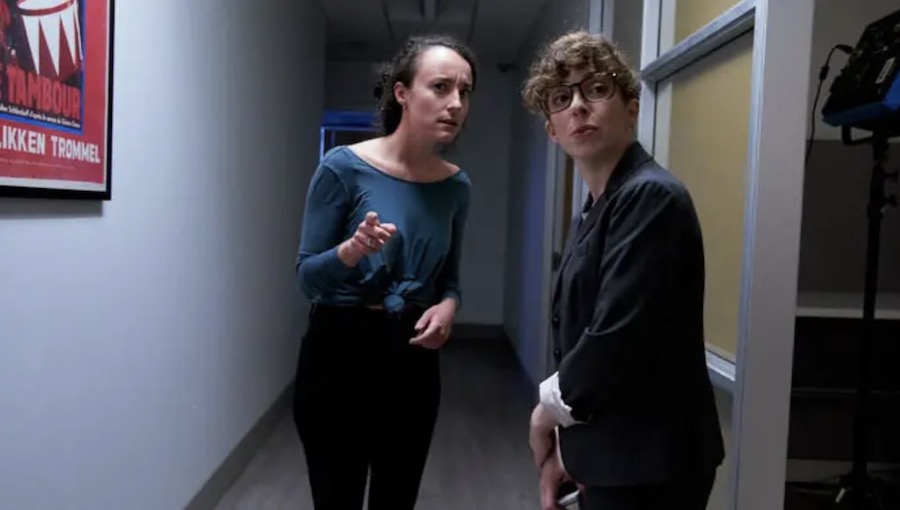If you’re a millennial who has ever started at the bottom of the corporate ladder—and stayed there—then you need this movie in your life. Bonus points if you’ve lived and worked in L.A. It lampoons everything from nonsensical corporate-speak to social media influencers to struggling to work in Hollywood to the L.A. dating scene, and more. The situations in this movie are completely outlandish but, at the same time, feel uncomfortably familiar.
Mary Tyler, Millennial is billed as a horror-comedy, and it’s very funny, but not really scary in the traditional sense. What it is, is brimming with existential dread. You’ll be watching a scene that’s completely off-the-wall and ridiculous, and, suddenly, it will dawn on you just how familiar it actually feels. It’s kind of terrifying—but also hilarious.
Mary Tyler (Mary Ryan) has just moved to L.A. and gotten a job at DaJaVue (pronounced Deja View), the hottest new company which is getting ready to launch its world-changing new product, the DaJa. What does the DaJa do? It does everything. What does that mean? How could you ask such a silly question? Now shut up and get back to work.
Mary works as an AII – Assistant Influencer Influencer. Her department head, Margaret Q (Karen Forman), is tasked with influencing social media influencers to help them promote the DaJa, and it’s Mary’s job to assist her. Assist her how? Doing what? How could you ask such a silly—well, you get the idea. It’s never entirely clear what anybody actually does at this company, much less what the company itself actually does. It does, however, involve a promotional tie-in with some branded water.
The head of DaJaVue is Izabella (Lucy Blehar), the youngest CEO in America; rich, powerful, driven, and probably evil, she’s taking the world by storm—though by doing what is anybody’s guess. Always at her side (whether Izabella wants her there or not) is Constance (Brigid Marshall), her faithful assistant. When she’s not vying desperately for Izabella’s approval, she’s singing her praises to Mary and the rest of the team. If DaJaVue is a cult, Constance hasn’t just drunk the Kool-Aid. She’s injected it into her veins.
The longer Mary works at DaJaVue, the stranger and more disjointed things become. Days start to run together. What day even is it? How long has she actually been working there? It couldn’t have been THAT long, could it? Meanwhile, sinister things are going on behind the scenes at the company. What, exactly, is all of this for? What is it the company does? And why do they keep trying to get Mary to let them put a chip in her head?
Fortunately, while Mary seems to be spending an increasing portion of her time at her job, she does at least have one friend outside of work. Shelley (Sarah Moliski) is Mary’s roommate and childhood friend, a struggling actress who’s just been cast in a series where she plays a singing, crimefighting cat. She’s been in L.A. a bit longer and knows the ropes, so she’s able to help keep Mary grounded—or as grounded as anybody can really be while living and working in L.A.
Interspersed with the action are snippets from DaJaVue job interviews. A somewhat sinister interviewer asks Mary, her coworkers, and a host of other characters a variety of questions, beginning with the standard, “What are your best qualities?” and “Why do you want to work here?” and slowly becoming more bizarre and ridiculous. It takes a surprisingly long time for the questions to become more off-the-wall than some of the questions I’ve been asked in real job interviews. Their answers to these questions are often hilarious, though, and one of the best parts of the film.
This whole film is clearly a labor of love for writer/director David Schrader. It wouldn’t surprise me if it’s also a labor of hatred and spite for some soul-sucking corporate job in Schrader’s past. I myself spent some time working in a very similar environment to this, and the stories I wrote during that time had much the same vibe as this film.
The film is super low budget, but that actually works in its favor. The homemade quality adds to the creepy and sinister feel. It also makes it feel more real, even when things are at their most outlandish. Some of the shooting locations look oddly familiar, as well. I think I may have worked on a couple of independent film projects that shot in some of these same places.
Or maybe everything in L.A. just sort of looks like that. Maybe that same Memento poster hangs in hallways in office buildings all over the city. It wouldn’t surprise me. But either way, the sense of (if you’ll pardon the expression) déjà vu added to the film’s general feeling of low-grade existential crisis.
The existential dread and underlying creepiness are done very well in this film, but, first and foremost, it’s a comedy, and it’s often laugh-out-loud funny. The actors are all very talented, taking these ridiculous, over-the-top characters and playing them completely straight, even understated—which just makes the whole thing that much funnier.
All in all, this is a very entertaining movie. If you’ve ever had your soul sucked out by an office job, if you’ve ever tried to make your way as an actor in Hollywood, or if you’ve ever just lived and struggled in L.A., then Mary Tyler, Millennial is the film for you.
Creative Team: David Schrader (writer, director, producer), Matt Friedberg (cinematographer, producer), Paul Tarantino (editor), Hunter Ochs (music), Karen Headings (producer), Irene Clegg and Susan Hornyak (executive producers)
Click here to view.

